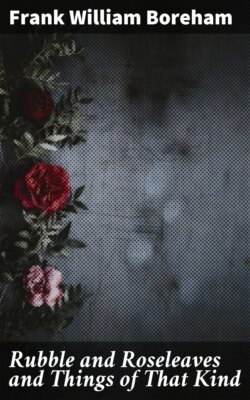Читать книгу Rubble and Roseleaves and Things of That Kind - Frank William Boreham - Страница 17
На сайте Литреса книга снята с продажи.
II
ОглавлениеTable of Contents
There is something to be said for Jack's way of looking at things. Our love of life is our master-passion. It animates us at every point. It is because we are in love with life that we see so much beauty in the dawning of a new day and find so wealthy a romance in the unfolding of the Spring. We feel that, among the myriad mysteries of the universe, there is no mystery so elusive and so sublime as this one. A living moth is a more wonderful affair than a dead moon. Indeed, we only recognize the strength of the hold that life has upon us when there is some question of its extinction. Let a man stand on the seashore, and, unable to help, watch an exhausted swimmer struggle for his life in the seething waters; let him look up and follow the movements of a steeplejack as he climbs a dizzy spire; let him visit a circus and see an artist hazard his life in the course of some sensational performance; and, for the moment, he will find his heart in his mouth. The blood will forsake his face; he will be filled with trepidation and palpitation; he can scarcely breathe! And why? The people in peril are nothing to him. For him, life would go on in just the same way whether they live or die. Yet their danger fills him with uncontrollable excitement! Or look, if you will, in quite another direction.
I was in a tramcar yesterday afternoon. In the corner opposite was a lad—probably an errand-boy—curled up with a book. His sparkling eyes were glued to the pages; his face was flushed with excitement; he was completely lost to his immediate surroundings. I rose to leave the car. The movement evidently aroused him. He glanced out of the window, and then, with a start, shut the book and sprang up to follow me.
'Have you passed your proper corner?' I asked when, side by side, we reached the pavement.
'Yes, sir,' he said, 'I was reading the book and never noticed.'
'Exciting, was it?' I inquired, reaching out my hand for the volume. On the cover was a picture of a Red Indian galloping across the prairie, with a white girl thrown across the front of his saddle.
'My word, it was!' he replied. 'It's about a fellow who was flying for his life from the Indians and took refuge in a cave. And, when he got back into the dark part of the cave, he felt something warm and then heard the growl of a bear. My! I thought he was dead that time!'
And what did it matter? It was nothing to this errand-boy whether this hero of his—a mere frolic of an author's fancy—lived or died. And yet the life or death of that hero was of such moment to him that, for the time being, his mind lost its hold upon realities in order that it might concentrate itself upon a fight among shadows! It is our intense, our persistent, our unquenchable love of life that explains the fascination of all tales of romance and adventure. 'With man as with the animals,' says Dr. James Martineau, 'death is the evil from which he himself most shrinks, and which he most deplores for those he loves; it is the utmost that he can inflict upon his enemy and the maximum which the penal justice of society can award to its criminals. It is the fear of death which gives their vivid interest to all hairbreadth escapes, in the shipwreck or amid the glaciers or in the fight; and it is man's fear of death that supplies the chief tragic element in all his art.' When we find ourselves following with breathless interest the movements of the traveller, the hunter or the explorer, we fancy that our emotion arises from a solicitude for the man himself. As a matter of fact, it arises from nothing of the kind. It arises from our love of life-for-its-own-sake.
In his Lavengro, George Borrow describes an open-air service which he attended on a large open moor. The preacher—a tall, thin man in a plain coat and with a calm, serious face—was urging his hearers not to love life overmuch and to prepare themselves for death. 'The service over,' Borrow says, 'I wandered along the heath till I came to a place where, beside a thick furze, sat a man, his eyes fixed intently on the red ball of the setting sun.' It looked like his old comrade, Jasper Petulengro, the gipsy.
'Is that you, Jasper?'
'Indeed, brother!'
'And what,' enquired the newcomer, sitting by the gipsy's side, 'what is your opinion of death, Jasper?'
'Life is sweet, brother!'
'Do you think so?'
'Think so! There's night and day, brother, both sweet things; sun, moon and stars, brother, all sweet things; there's likewise a wind on the heath. Life is very sweet, brother; who would wish to die?'
I need say no more in order to show that there is a good deal to be said for Jack Linacre's way of looking at things.
How beautiful it is to be alive!
To wake each morn as if the Maker's grace
Did us afresh from nothingness derive
That we might sing 'How happy is our case!
How beautiful it is to be alive!'
From Jack's point of view there can be no doubt that one living dog is worth all the dead lions that ever were or will be!
